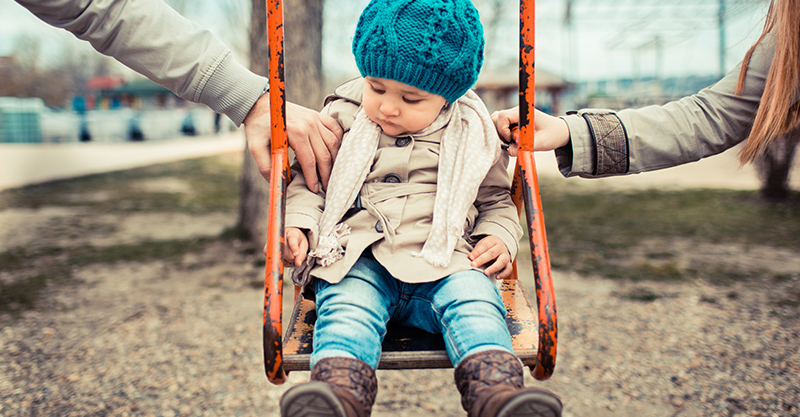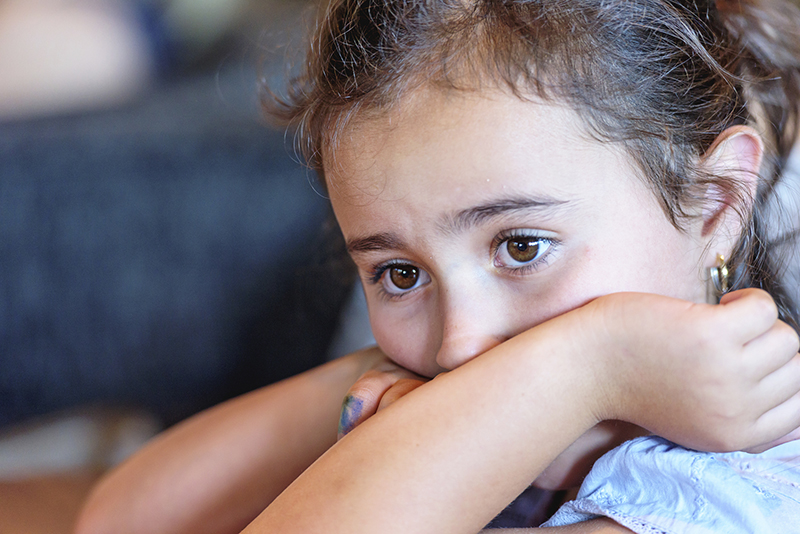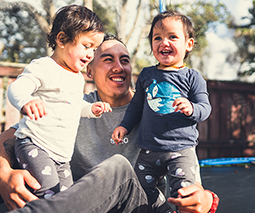How to handle co-parenting when you’re at war with your ex

Some ex-couples are smashing it in the co-parenting department … and then there are those who are waging a full blown war.
We spoke with two parents doing it tough, and a relationship expert, delving deeper into troubleshooting problems with an uncooperative ex. Here’s what we found out …
Communication breakdown
Most couples break up because of a lack of communication, so it’s not surprising that separated parents struggle to see eye to eye. Navigating logistics and working through conflict can be incredibly time-consuming and emotionally draining for both parents. It can also have long-term negative effects on the kids involved.
“When there’s no communication between parents it’s extremely difficult. One’s asking questions and not getting answers, they show their frustration to the other who then becomes defensive and there’s an escalation of the conflict,” says David Roberts, professional counsellor and Practice Leader for Relationships Australia NSW.
“A lot of people just get stuck there and don’t know what to do, and meanwhile it’s incredibly bad for children. Kids are really sensitive to what’s going on at home, they pick up on things and aren’t as resilient or adaptable as most think.”

The cold war zone effect
According to David, there’s been a lot of research done in this area with it likened to being brought up in a cold war zone.
“Children absorb the stress and either internalise how they deal with it – such as developing anxiety, depression or negative self-image – or they externalise it, so they might become antisocial, aggressive or non-compliant,” he says.
Very young children are most at risk though, because they’re in the most critical phase of their life in terms of development.
“If you’ve got a mum or dad who’s distracted by parental conflict it can create insecure forms of attachment with their child,” says David.
He adds that parents can also become inconsistent or neglectful, or children might develop a fear of their parents leading to detachment.
“Parents need to be aware that personality types are being influenced by the conflict from a very early age, which sets the course of their lives.”
Read more about relationship issues:
- The great debate: Should you put your partner or your kids first?
- Should I stay or should I go: Is your relationship worth saving?
- Worried about fighting in front of your kids? You should be!
Other problems
When parents aren’t communicating other logistical problems can also arise for children, such as not having their favourite toy, the right gear for sports, or missing events.
In David’s experience, usually one parent blames the other and this then puts the child in the middle of the conflict.
As a result kids might become ostracised among their friends or live in a constant state of uncertainty and worry about whether they’re in the right place or have all their belongings, which also has an impact on their behaviour.
Bringing in reinforcements
According to David, if your ex isn’t cooperating, the first thing to do is get external help from a non-profit family relationship centre such as Relationships Australia. For very little cost they can provide advice, organise mediation and develop co-parenting plans to foster ongoing communication. It’s important to do this early rather than letting things drag on.
If mediation isn’t possible, then legal action may be required. Sometimes just having a letter sent from legal aid to the other parent threatening court is enough to make them want to cooperate, but where possible seek paths such as mediation first before getting lawyers and the courts involved, as it can exacerbate negative behaviour and be very costly.

“He refused to negotiate”
Someone who’s no stranger to the legal path is mum of two, Veronica*. She had hoped for mediation with her ex-husband but after he refused to attend sessions she worked with a separation adviser who gave her legal advice, helped her write emails and find the right lawyer.
“I ended up having to arrange supervised visits for my children with their dad for a while, and issue a summons so he would pay child support. It was stressful when they started collecting as it was deducted automatically from his work which made him extremely unhappy and he spent a lot of energy telling me so,” she says.
For her mental health, Veronica had to redirect her ex’s emails to her junk-mail and now communication between them is only done through legal means.
“I bought the kids an old iPad each so they can stay in touch with their dad daily via email or Skype and I don’t have to facilitate anything. Obviously this wasn’t possible when they were little but now they’re seven and nine it works well,” she adds.
“It makes people bonkers”
Another mum of two, Sophie*, has also had to endure years of toxic feuding with her co-parent.
“Divorce or separation tends to make people go a little bonkers. Two people that once shared everything all of a sudden can’t be in the same room together and they become immersed in a battle that’s really driven by subconscious patterns of fear and control,” she says.
With no other option but to go down the legal path, she doesn’t however recommend this for others unless absolutely necessary.
“After four years and many tens of thousands of dollars all that happened was we both walked away more emotionally and financially damaged than we could have ever imagined. Pretty much all chances of a communicative relationship have been obliterated.”

Lessons learned the hard way
According to Sophie, her biggest lesson was letting go of what she couldn’t control – such as when her children were with their dad and all the changes in their new family dynamic.
“Realising the only thing I could control was my reaction and the way I responded to my ex, plus the time that I was with my children, was pivotal,” she says.
Other tips she has for other feuding co-parents:
- Remain child focused – Leave the beef with your ex out of any negotiations, even though a toxic situation makes this hard.
- Do not engage – This became her mantra because if one party wants to fight but the other doesn’t the fight meets a dead end.
- Think before you send – Bashing out an angry email is fine but leave it 24 hours until emotions have subsided then reevaluate.
- Use a communication portal – Apps such as 2 Houses are a great tool to centralise any calendar sharing or communication.
Adding to this is Veronica’s advice to remember that children and finances are completely separate, along with other personal issues.
“You can’t deny the father seeing his kids if he hasn’t paid child support for six months or has a drinking problem. You just need to make sure the kids are safe when they see him (e.g. supervised visits) and let go as much as possible regarding finance,” she says.

More tips for parents under pressure
Here are additional tips from David for those co-parenting with a difficult ex:
- Treat it like a business arrangement – Move away from emotional responses.
- Don’t belittle the other parent – To do this is to your child is to belittle some aspect of themselves in a way.
- Don’t unload your frustration – It’s tempting to send a message of frustration via your child but it shouldn’t be their burden.
- Don’t organise activities without consent – Extra curricular activities such as sports may encroach on the other parent’s time which adds fuel to the fire.
- Don’t interrogate your child – When they come back from the other parent, don’t grill them. This creates pressure and anxiety plus they might distort the truth to try and please you which could lead to more parental conflict.
- Look after yourself – See a counsellor or therapist and look after yourself in other ways which will in turn help your child.
- Show the love – Create a safe, secure and loving environment in your home. And when they aren’t with you make sure you have a phone arrangement so they don’t feel abandoned. This is really important especially if they’re little but it’s only possible if the parents are communicating.
Hang in there
The key thing to remember is that there is support out there if you need it, so don’t feel you’re alone in your co-parenting battle. For the sake of your children and your own well-being don’t be afraid to reach out, and you just never know when things might improve.
Veronica hopes that one day her and her ex will be friends, but she is doubtful.
“I’ve learnt I can’t control him and just have to work around it,” she says. “It’s not an easy road but I do think the support offered at Relationships Australia and having a good adviser got me through the worst. My dad’s ex wife still comes to every Christmas with us all so there’s hope yet!”
Do you have a difficult co-parenting relationship with your ex-partner? Share your tips with us on our Facebook page.
* Names have been changed due to the sensitive nature of the article









